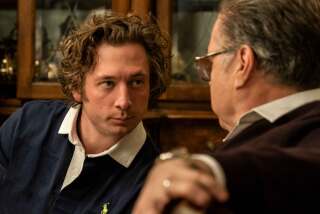Fairy Tales and a Story About Fish
- Share via
SANTA BARBARA — He was perched on a downtown wall, trying to catch the eye of tourists and shoppers as they strolled by, bags clutched firmly in hand, all business. He wore a red woolen shirt with a hole in the back, stone-washed jeans and tennis shoes. His pale blue eyes were pretty clear. He needed a shave, though, and his breath smelled like too many New Year’s mornings.
“Got a quarter, man?” he asked, shaking a McDonald’s coffee cup. “I’m saving up for swimming lessons so I can get out of here and go to Hawaii.”
He smiled a wan smile. More than a few teeth were missing. A notebook came out, and a conversation began. The panhandler gave his name as Jim Brown. But, he added, brightening, “people call me Fish.” And he told his story.
Fish said he had been living on the street since 1981--”right here in Santa Barbara, the prettiest place you can find anywhere.” He had lost his house and fishing boat in divorce court. “A judge made a bad decision,” he said. Anyway, there had been a recent reversal, and any day now the state would be sending him “a big piece of change.” Ask anyone at Joe’s Cafe, he said. They would verify it.
That would not be necessary, Fish was told. All that mattered was that he clearly was an expert on the topic at hand--panhandling. “You bet,” he said, shaking his paper cup. Two, maybe three coins rattled around inside.
*
Transients in general, and street beggars in particular, have come under attack throughout California. Cities that once congratulated themselves for their compassion--Santa Monica, Berkeley, San Francisco, Santa Cruz--now devise complicated strategies for driving out transients. These panhandler crackdowns, it is said, will buck up the local economy, will indirectly help cure the cancers that fester in society’s underbelly. Or so go the modern fairy tales now told to justify the old, old job of running beggars out of town.
Here in Santa Barbara, a new “Say No to Panhandling” promotional campaign has been initiated by the Chamber of Commerce. “Make your change help, not hurt,” the slogan goes. Fish knew all about it. He knew the theory was to deprive downtown panhandlers of spare change and, thus, deprive them of booze and drugs. That way maybe they would go straight. Or maybe they would just go somewhere else.
Speaking as an expert, Fish regarded the campaign as more than a bit misguided, a product of misperceptions. “Most of the people that panhandle,” he said, “are on Social Security. Some are winos and drug addicts, but most of them are just old-timers who pay $550 a month to live in some doper hotel. That leaves about $100 for food and clothes and anything else. When they run out of money, they panhandle. It’s how they eat.
“Myself,” he said, “I don’t get any government checks. This”--he rattled the cup again--”is how I make a living. Eight or 10 bucks a day is all it takes. That buys me my cigarettes, beer and dinner. Once I do that much, I go home for the day.”
Home, he said, is a downtown deli, where he sleeps in a bedroll on the porch and dreams of businesses he will start, once that check from the divorce case comes flying in. Fairy tales.
*
Although Fish doubted that the Say No campaign would “make a bit of difference,” he was not unsympathetic toward its advocates. There were new faces on the street, he said, some rough, some pushing drugs, all rude. “They don’t know how to talk to people,” he complained. “They don’t have the intelligence. You have to humor people. Make ‘em laugh. Tell ‘em a joke. I say stuff like, ‘Care to adopt an aging hippie?’ or ‘I’m saving to buy a condo in Montecito.’ It makes people feel better about me.”
Do you like this life, Fish?
He stared into his cup.
“No,” he said flatly. “I hate it.
“But what the hell else are you going to do? I can’t go no farther down, except six feet. You make the best of your situation, right? You do what you can to survive. What else can you do?”
Yes, what can you do?
The interview completed, Fish’s cup was made a good deal noisier. Call it Spare Change journalism, misguided charity. Perhaps it was, but the fairy tale I prefer to believe is that Fish will spend his panhandling money on swim lessons, just like he said, and someday paddle off to Hawaii. Will it make California a better place? Will it make everything just perfect? Well, that’s another fairy tale altogether.
More to Read
Sign up for The Wild
We’ll help you find the best places to hike, bike and run, as well as the perfect silent spots for meditation and yoga.
You may occasionally receive promotional content from the Los Angeles Times.







